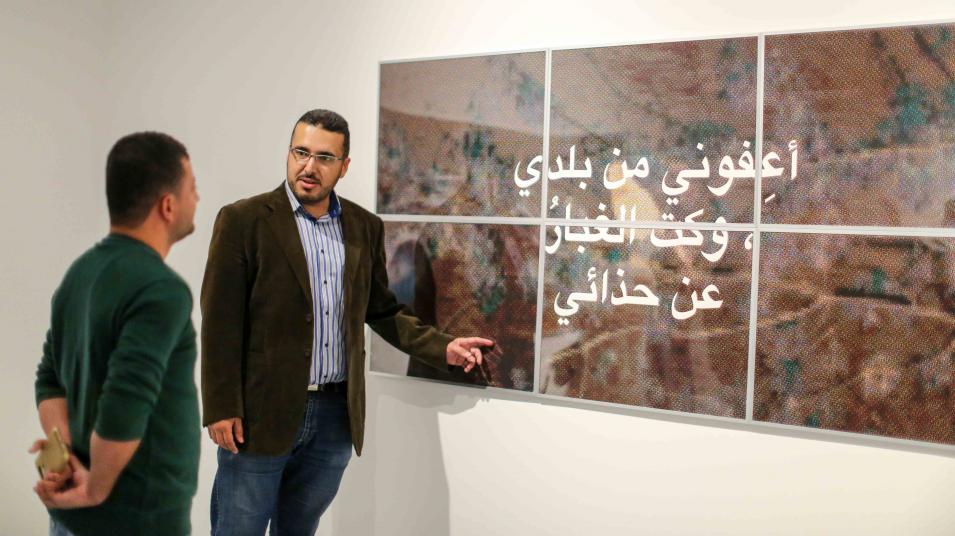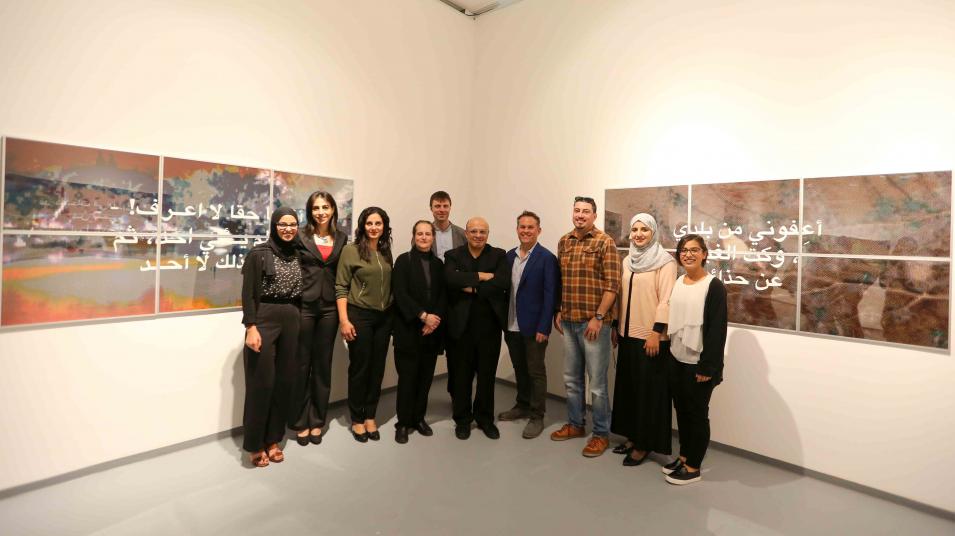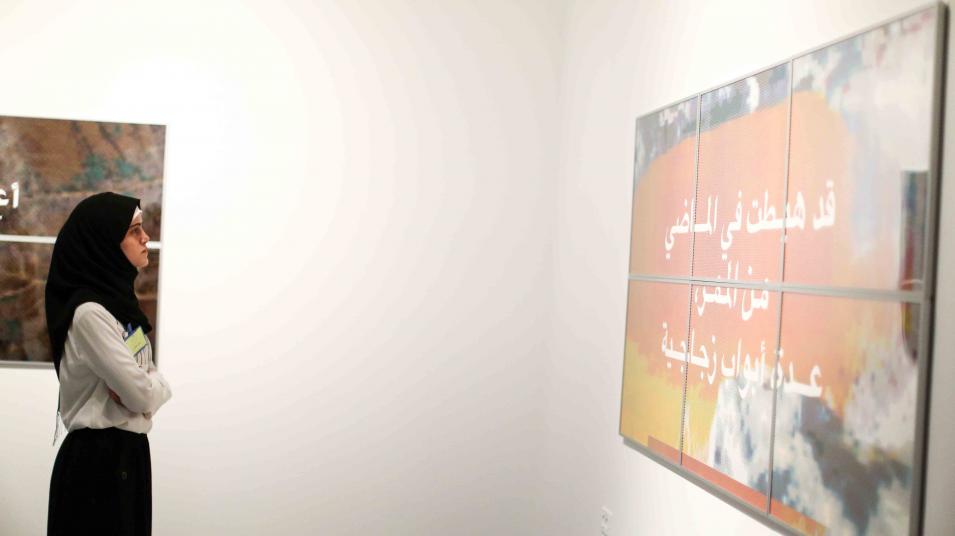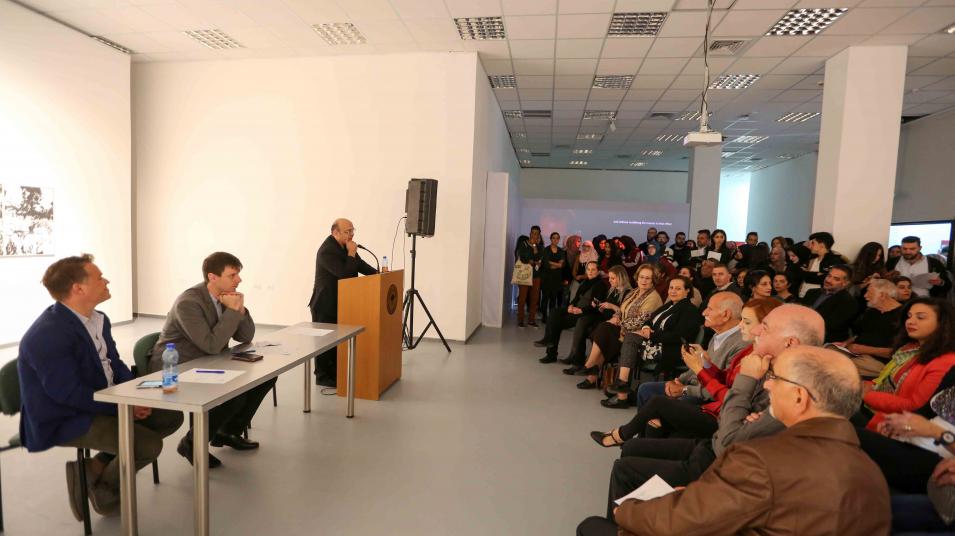“Exile is Hard Work”: An exhibition questions revolution, exile and national identity
Birzeit University Museum launched the solo exhibition “Exile is Hard Work” by the Palestinian artist Aissa Deebi, marking the themes of revolution and exile, and raising a number of issues related to their original context in international exhibition in which national identity plays a particular role. The exhibition is curated by Noah Simblist and Beral Madra.
The exhibition, which will on display until January 4, 2018, includes two bodies of work by Deebi: The Trial (2013) and Motherland (2016). The projects were previously conceived for biennials: The Trial for the 2013 Venice Biennale and Motherland for the 2016 Çanakkale Biennale.
Dr. Khalil noted that Deebi’s artwork aligns with the university’s mission to support and engage in contemporary arts and cultural activities that bring dynamic color and depth to the university and Palestinian society in general. “Birzeit University is dedicated to serving the university community and the greater Palestinian public in general, by stimulating a rewarding experience in academia and creative thinking.”
“The opening of this exhibition is an exceptional opportunity for students, academics and artists to discuss topics on the question of identity, and the effects of exile on those who are far away, through visual arts,.” Khalil continued, “
The artist, Deebi, expressed his excitement to present his artwork in his homeland after creating it in exile. He explained to the audience why he integrated his two projects into one. “The Trial and Motherland are not only artworks that are about political and personal histories of Palestinian dispossession and exile; they also evoke the larger exhibition histories that have embedded within them relation to political currents.”
Deebi further explained his two works: “The Trial is a two-channel video installation that depicts a group of actors in a black box theater reading from the transcript of a 1973 statement made by Daud Turki, a Palestinian poet who was on trial in an Israeli court for espionage and collaborating with the enemy. Turki was a communist and his statements echo the revolutionary rhetoric of the time. At the time of its making, I was living in Cairo, in the wake of the 2011 revolution in Egypt. While this work stems from the particular nature of Palestinian revolution and its links to international currents of revolutionary struggle in the 1970s, it has resonance with Egypt’s political situation in 2013 and larger questions about revolutionary struggles in general.”
“Motherland is an elegy to my mother and a photographic meditation on exile,” Deebi said. Deebi shot images of landscapes in the United States and Switzerland, two countries where he has lived for the past few years. This project asks how we define “home” and “mother.” What is the affective nature of being in-between spaces? Finally, how do larger political currents relate to one’s personal life? Motherland will be shown as a series of photographic prints that evoke the poetics of space.
Aissa Deebi is a Palestinian artist and scholar based in Geneva. His early work investigated the complexity of daily practices in post-1948 Palestine, including Days Like This (1997): Makkan (1998); My Dream House (1999); and Nothing is New, Only Forgotten (2000). Later, Deebi’s work tackled the theme of immigration and alienation, which culminated in his PhD, providing critical analysis of Diaspora as a creative space. In tandem with his scholarly work, Deebi produced a body of works that interrogate the complex phenomena of cultural-migration and Diaspora reality as experienced by a Palestinian immigrant artist in post-Sept. 11 America. These works included Killing Time (2004); Naked Heroes (2003); Dead Sweet (2004); and Tal El Samak (2011). Deebi also represented Palestine at the 55th Venice Biennale. Dr. Deebi has taught at the Winchester School of Art, University of Southampton, in the United Kingdom; Centro de Estudios Superiores de Monterrey Design, Mexico; Chulalongkorn University, Bangkok, Thailand; The American University of Cairo’s Arts Department as a Professor of Art and Design; and in 2016-2013, Dr. Deebi was the chair of the Department of Art & Design at Montclair State University.
Dr. Deebi was the founding member of Art East, New York, where he served as the first Director of the Visual Arts and Director of the Board. His work has been exhibited globally, including: The Venice Biennale; Çanakkale Biennale, Turkey; Art Lab Gnesta, Sweden; Berlin Art Laboratory, Germany;Art Space Gallery at Sang Myung University, Seoul, Korea; Darb 1718, Cairo, Egypt; Kunstverein, Germany; The Queens Museum of Art in New York; Haus am Lutzowplatz in Berlin; Tanit Art Gallery, Beirut, Lebanon; Beirut Art Fair, Lebanon; Asia-Pacific Triennial, Taipei in Taiwan; VCU Art Gallery in Doha; Elga Wimmer Gallery in New York; and Art Dubai.










